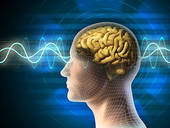 “Mom, what is autism?”
“Mom, what is autism?”
This was the question I got from my seven-year-old daughter just recently. At that moment, I was more prepared to tell her where babies come from. My husband and I have always made it a point to talk about her brother’s challenges and answer all of her questions. She knows he has seizures. She knows he has diabetes. Medical stuff is easy to explain. Explaining her brother’s autism has been a little more difficult.
Her life began watching her brother in therapy. She was a newborn baby at the time when Early Intervention started. The relentless flow of ABA teachers, speech therapists, physical therapists and occupational therapists. When she was old enough to walk, she would stand at the baby gate while her brother was with his ABA teacher and protest (quite loudly) that she wanted to be at that little table doing exactly what he was doing. Even at one year old, she was protective and supportive of her brother. She learned sign language along with him and, at 8 months old, she knew about 10 signs.
When it was time for her brother to go to preschool, she came with me for the 45-minute drive to the school especially for children with autism. At age four, when she asked me why her brother doesn’t talk like everyone else’s brothers, we tried to explain it to her the best way we could so she could understand at her level. She told us it made her sad, but he would talk one day, she was sure of it. I told her that we were too. This was followed by a big hug and kiss, and she seemed content with the answers. But kids are much more inquisitive and intuitive than we give them credit for sometimes. Since she turned seven this past year, she’s become very wise in her young age, and our simple answers just aren’t cutting it anymore.
“Mom, what is autism?”
I could answer that question in a heartbeat if I were talking to an adult: vaccine damage, encephalitis, toxic overload, yeast, bacteria, viruses all creating havoc in the body. Environmental toxins. Autoimmune dysfunction. Are these things I can tell a seven-year-old? How much will she understand? She knows he can’t talk because of the shots he got when he was a baby. She understands why we can’t go to the movies because it’s too loud for him. She’s okay with the fact that we have to leave the park if he has a meldown. Her entire life has revolved around autism, the good and the bad.
So I asked her, “What do you think autism is?” “I think it’s brain damage.” Me: “Why do you think that?” “Because when we go to the doctor (neurologist), he talks about his brain all the time and that it doesn’t work right.” In her brother’s case, this is part of his autism diagnosis.
 Seizures have had a profound effect on his neurologic development. On every vaccine insert, listed as a possible side effect, is seizures. That should give any parent a reason for concern. If you read the paper given to you by your pediatrician, this side effect is written in a very comforting way to lull you into a false sense of security. It states that having a seizure is very rare, and there’s a good chance statistically that this will never happen to your child. But what if it does? This is taken directly from the CDC website regarding only febrile seizures:
Seizures have had a profound effect on his neurologic development. On every vaccine insert, listed as a possible side effect, is seizures. That should give any parent a reason for concern. If you read the paper given to you by your pediatrician, this side effect is written in a very comforting way to lull you into a false sense of security. It states that having a seizure is very rare, and there’s a good chance statistically that this will never happen to your child. But what if it does? This is taken directly from the CDC website regarding only febrile seizures:
“Although febrile seizures can be frightening for the child’s caregivers, MOST are harmless. The MAJORITY of children who have febrile seizures recover quickly and have no lasting effects.”
Let those two words sink in: Most. Majority. Why are we so willing as a society to play Russian Roulette with our children’s neurological development? I know there are people who will defend the vaccines and claim that they keep communicable diseases under control. I get that. Who wants their child to die from the measles? But you have to ask yourself the question — at what cost? What about the infants and children who are not lucky enough to be part of the MOST or MAJORITY group? Jenny McCarthy details in her book about her son going into cardiac arrest during a seizure. It’s maddening how these side effects are not taken more seriously. Would you be so willing to vaccinate your child if you knew it could potentially lead to seizures and possibly cardiac arrest? Why are pediatricians so angry when we as parents ask questions?
I can tell you from first-hand experience, seeing your child turn blue while having a convulsion is more than “frightening.” It will bring you to your knees. It will change your life forever. It keeps me up at night, checking on my son every few hours. Looking back, my son had his first seizure at nine months old, but at the time I didn’t know it was a seizure. He was crying in his crib, extremely pale and had thrown up. He slept so soundly for hours afterwards. I chalked it up to him having a virus and called the doctor who confirmed the same thing. What I didn’t know is that was the postictal phase after having a seizure. He had his first tonic-clonic seizure a few years later. Talking with the neurologist, it became apparent to me that my son was having absence seizures for a long time without my knowing these were actually seizures. My son’s lack of speech should have been the biggest factor in pursuing an EEG to determine if he was having seizures. My pediatrician never recommended it.
It’s estimated that epilepsy rates among those with autism range from 20 to 40 percent, with the highest rates among those most severely impaired by autism. I believe the number is much higher. I wouldn’t have known my son was actually having seizures had he not had a tonic-clonic seizure that was impossible to miss. The good news is that with proper treatment, many children are recovering skills that were lost and language that had disappeared, all due to undiagnosed seizures. I urge all parents to pursue an EEG if your child is diagnosed with autism, especially if they have speech delays. It could be a piece of the recovery puzzle for your child. For my son, we’ve seen more skills emerge as we achieve better seizure control. Seek out practitioners who understand the autism and seizure connection.
 My daughter asked me one last question, “Mom, can autism be healed?” I told her that I think it can be and we’re gonna try really, really hard and never give up. If you reach for the stars and only make it halfway, you’re still halfway from where you started. No matter what level of healing we can achieve, it will certainly make a positive difference in her brother’s life.
My daughter asked me one last question, “Mom, can autism be healed?” I told her that I think it can be and we’re gonna try really, really hard and never give up. If you reach for the stars and only make it halfway, you’re still halfway from where you started. No matter what level of healing we can achieve, it will certainly make a positive difference in her brother’s life.
For more information about seizures and autism here is a great link from our friends at TACA.
UPDATE: This is a blog that I wrote in April of this year (editor’s note: April of 2012). Since then, there has been an exciting study published in an online edition of the journal, Science. Click here to read the study in its entirety.
The researchers from the University of California at San Diego discovered a genetic defect in the BCKDK gene. This mutation results in low levels of certain protein-building blocks called branched chain amino acids (BCAAs). In the paper, the researchers described how mice carrying the same mutated gene have symptoms resembling autism with epilepsy. When the researchers fed them BCAAs, their condition reversed. When the researchers supplemented the diet of people with mutations in the BCKDK gene, it raised BCAA levels in their blood. However, the study was not designed to test whether this increase in BCAA resulted in improved symptoms in the subjects.
Also, the research team makes a few noteworthy points about the study:
*The type of autism and epilepsy we identified is very rare. Gene testing for the condition isn’t currently available. However, a doctor can order a test called serum amino acid profile, to look for BCAA deficiency.
*At present we have no evidence that the supplements will benefit individuals who have this form of autism and epilepsy or any other form of the disorder.
*While these supplements are available without a prescription, they can be harmful to people with certain other disorders. We strongly recommend against taking them without proper medical supervision.
For more information about the Gleeson Neurogenetics Laboratory and this study, you can visit their website at http://cbd.ucsd.edu/.
~ Savage
Click here to read more blogs by Savage.

















Savage- how are you managing the seizures? Do you use pharmaceuticals or other alternative treatments?
I do have my son on Keppra right now, but it’s not a very high dose. Even with the Keppra on board, he was still having seizures twice a month. Not until I addressed his underlying PANDAS symptoms with herbal supplements did we see a drastic reduction in seizures. I LOVE Olive leaf extract and Oil of Oregano. I also supplement with ascorbic acid. This keeps his bowels moving during the detox. This past May, I also added 3 supplements for his apraxia that has given us the added benefit of even greater seizure control. I use Phosphatidylcholine, vitamine E and DHA. These three things have greatly increased his motor skills, receptive and expressive speech and he has been seizure free since June! Phosphatidylcholine is essential as a precursor to neurotransmitters and their proper function. I hope this is helpful to you 🙂
YES! Very helpful- thanks so much for the quick reply. I’m not super familiar with the Phosphatidylcholine. Looks like I have some researching to do! THANK YOU
I have dealt with human umbilical stem cells in the past and we treated 1 autistic girl who was 17 years old and was crying all day at home. That was approximately 7 years ago and since then she has graduated college and is now engaged.
Febrile seizures and clonic-tonic/absence seizures are not the same thing and don’t have the same cause. The vaccine packaging is referring to febrile seizures AKA febrile convulsions. Its a long bow to draw to connect the two.
This is what the Infanrix package insert (the first one I looked at) says about seizures:
Under “Contraindications”:
“EncephalopathyEncephalopathy (e.g., coma, decreased level of consciousness, prolonged seizures) within
7 days of administration of a previous dose of a pertussis-containing vaccine that is not
attributable to another identifiable cause is a contraindication to administration of any pertussis containing
vaccine, including INFANRIX.”
“4.3 Progressive Neurologic Disorder
Progressive neurologic disorder, including infantile spasms, uncontrolled epilepsy, or
progressive encephalopathy is a contraindication to administration of any pertussis-containing
vaccine, including INFANRIX. Pertussis vaccine should not be administered to individuals with
these conditions until a treatment regimen has been established and the condition has stabilized.”
Under “Warnings and Precautions”:
“Adverse Events Following Prior Pertussis Vaccination
If any of the following events occur in temporal relation to receipt of a pertussis containing
vaccine, the decision to give any pertussis-containing vaccine, including INFANRIX,
should be based on careful consideration of the potential benefits and possible risks:
. . .
• Seizures with or without fever occurring within 3 days.”
“Children at Risk for SeizuresFor children at higher risk for seizures than the general population, an appropriate
antipyretic may be administered at the time of vaccination with a pertussis-containing vaccine,
including INFANRIX, and for the ensuing 24 hours to reduce the possibility of post-vaccination
fever.”
It would seem that that last one is specifically about febrile seizures, though it doesn’t say so. The other mentions, on the other hand, make it clear that “pertussis-containing vaccines” can cause other kinds of seizures as well.
We were one of the lucky ones. Whether it was fate or finding the right doctors or the right therapy or the right supplements we have a 15 year old who is I think, is symptom free and loving his life - for the most part, as a very typical teenager. We have a laundry list of things we do daily to keep him there, but he is there.
I would like to help another family through our experiences, if I can.
Keep up the amazing work,
Amanda
I believe America is Way Behind (even with Autism Speaks). Where are the stem cell studies. It’s so non invasive! It’s healed all sorts of people. Where is this? I banked my childrens cord blood. Why are we lagging so far behind? $$$ again, the same reason we are in here. I know they are doing a Very small study. Come on - this is the REAL research! We need people doing GOOD things and making a difference. America has lost it’s edge. Break away people and Make A Difference!
I would change that first sentence to “I believe America is Way Behind (because of Autism Speaks). 😉